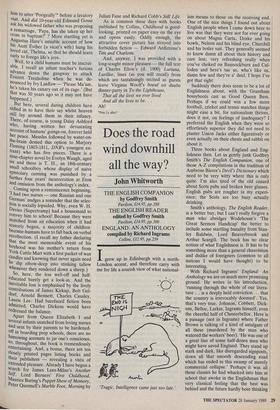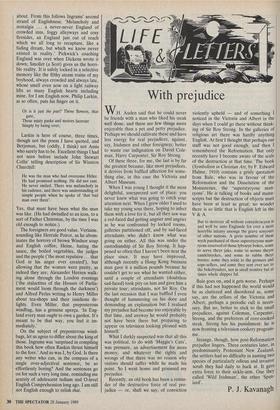Does the road wind downhill all the way?
John Whitworth
THE ENGLISH COMPANION by Godfrey Smith
Pavilion, f14.95, pp.288
THE ENGLISH READER edited by Godfrey Smith
Pavilion, £14.95, pp.300
ENGLAND: AN ANTHOLOGY compiled by Richard Ingrams Collins, £12.95, pp.239 Igrew up in Edinburgh with a north- London accent, and therefore carry with me for life a sourish view of what national- `Tragic. Intelligence came just too late.' ism means to those on the receiving end. One of the nice things I found out about English people when I came down here to live was that they were not for ever going on about Magna Carta, Drake and his bowls, Nelson and his blind eye, Churchill and his boiler suit. They generally seemed to know damn all about their history and care less; very refreshing really when you've choked on Bannockburn and Cul- loden and here's tae us, wha's like us, damn few and they're a' deid. I hope I've got that right.
Suddenly there does seem to be a lot of Englishness about, with the Grantham bossyboots cast as Good Queen Bess. Perhaps if we could win a few more football, cricket and tennis matches things might ease a bit, for nationalism thrives, does it not, on feelings of inadequacy? I preferred the English when they were so effortlessly superior they did not need to plaster Union Jacks either figuratively or even actually on their chests and rabbit on about it.
Three books about England and Eng- lishness then. Let us gently junk Godfrey Smith's The English Companion, one of those A-Z compilations in the tradition of Ambrose Bierce's Devil's Dictionary which need to be very witty where this is only quite. I'm also tired of the old canard about Scots pubs and broken beer glasses. English pubs are rougher in my experi- ence; the Scots are too busy actually drinking.
Smith's anthology, The English Reader, is a better buy, but I can't really forgive a man who abridges Wodehouse's 'The Great Sermon Handicap' the better to include some startling banality from Stan- ley Baldwin, Lord Beaverbrook and Arthur Scargill. The book has no clear notion of what Englishness is. It has to be something more than a general chauvinism and dislike of foreigners (common to all nations I would have thought) to be interesting. With Richard Ingrams' England: An Anthology we are on much more promising ground. He writes in his introduction, `running through the whole of our litera- ture ... is a deeply held conviction ... that the country is irrevocably doomed'. Yes, that's very true. Johnson, Cobbett, Dick- ens, Belloc, Larkin, Ingrams himself, even the cheerful half of Chesterbelloc. Here is a passage (not in Ingrams) where Father Brown is talking of a kind of amalgam of all these (murdered by the man who watered the workers' beer). 'He was one of a great line of some half-dozen men who might have saved England. They stand up stark and dark, like disregarded signposts, down all that smooth descending road which has ended in this swamp of merely commercial collapse.' Perhaps it was all those classics he had whacked into him at school that awoke in the Englishman that very classical feeling that the best was behind and the future hardly bore thinking about. From this follows Ingrams' second strand of Englishness: 'Melancholy and nostalgia ... a never-never England of crowded inns, foggy alleyways and cosy firesides, an England just out of reach which we all long to recapture, like a fading dream, but which we know never existed in reality.' Pickwick's coaching England was over when Dickens wrote it down; Smollet (a Scot) gives us the horri- ble reality. It is safely locked in a selective memory like the filthy steam trains of my boyhood, always crowded and always late, whose smell even now on a light railway lifts so many English hearts including mine, for I am English now. Philip Larkin, as so often, puts his finger on it.
Or is it just the past? Those flowers, that gate,
These misty parks and motors lacerate Simply by being over;
Larkin is here of course, three times, though not the poem I have quoted, and Betjeman, but (oddly, I think) not Amis who surely has to be. Excellent things I had not seen before include John Stewart Collis' telling description of Sir Winston Churchill:
He was the man who had overcome Hitler. He had promised nothing. He did not rant. He never smiled. There was melancholy in his cadence, and there was understanding of simple people when he spoke of 'that bad man over there'.
Yes, that must have been what the man was like. (He had dwindled to an icon, to a sort of Father Christmas, by the time I was old enough to notice.) The foreigners are good value. Verlaine, sounding like Hercule Poirot, as he abom- inates the horrors of brown Windsor soup and English coffee; Heine, hating the sauce, the boiled vegetables, the judges and the people (`the most repulsive ... that God in his anger ever created'), but allowing that the women were pretty, as indeed they are; Alexander Herzen walk- ing alone through the London evenings (`the stalactites of the Houses of Parlia- ment would loom through the darkness') and Alfred Perles writing to Henry Miller about tea-shops and their insidious de- lights. Even Miller, that preposterous windbag, has a genuine apercu. 'In Eng- land every man ought to own a garden. It's meant to be that way, you feel it im- mediately.'
On the subject of preposterous wind- bags, let us agree to differ about the king of those. Ingrams was 'surprised in compiling this book how often Ruskin thrust himself to the fore.' And so was I, by God. Is there any writer who can, in the compass of a single over-adjectival sentence, be so effortlessly boring? And the sentences go on for such a very long time, reminding me acutely of adolescent tedium and 0-level English Comprehension long ago. I am still not English enough to relish that.


















































 Previous page
Previous page